My mom wore satiny nightgowns: pale blue, light pink, sometimes yellow. They were sleeveless or cap-sleeved, decorated at the bodice with embroidered flowers, and cut to fall below the knee. As a child, I’d try to get close enough to subtly rub my arm against the soft, flowing fabric, feel its smoothness, its coolness.
Those opportunities were rare. Most nights, Mom zipped herself up, a thick, dark, velour bathrobe covering her delicate gown.
Tonight, Mom is lying in a cold metal-framed bed, an alternating-pressure air mattress inflating and deflating incrementally. The air pump groans. The mattress hisses.
I am fifty years old, feeling like eight, wanting to run my arm against the soft aqua of her gown. Over and back, over and back, over and back again.
When I was fourteen, I babysat for three children whose mother liked me and took me shopping for school clothes: pleated, plaid skirts in navy and green, and burgundy with a thin orange stripe; matching turtlenecks and knee socks; and a crisp mint-green spring jacket with hidden zippers at the pockets.
Her children were spoiled and unruly, but it was the son I liked the least. He was mean, cutting in his comments, overly dramatic in an effort to get attention.
One late fall afternoon, there is a pounding at the door to the garage. I am sure it is him, home from school and creating problems already, seeking my attention. I ignore him, count the seconds of my long, slow breath, then meander to the door and open it.
But it’s not the son. Instead, a sobbing young woman, black lines running from her eyes, down to her jaw, screaming, howling from the back of her throat, Oh my god. My mom. My mom.
For hours afterward, the children and I sit in an upstairs bedroom, looking out the window to the house across the street where I’d later learn a woman was murdered in her nightgown while her daughter attended high school.
Tonight, Mom’s breathing is labored. The pale, loose skin at the V of her neck pulls in tight with each breath. White embroidered flowers quiver with the beat of her tired heart. Her hands have drawn together, curved inward, clutching something unseen. I lift her hands gently, place a soft plush bear against the smoothness of her gown, memorize the feel of that fabric against my fingertips.
I dip a swabbing stick in cool water, soften the purple sponge tip before pressing it gently between her lips, and skim it slowly over her teeth, yearning to bring relief.
When I was five, I was sickly: bronchitis, strep throat, once pneumonia. Mom would take me to the doctor, let me pick out a color-by-number book at the pharmacy while she waited for my medicine. In the middle of the night, she’d awaken to my coughing, come into my room with a brown glass bottle and a shining silver spoon.
One summer night, the white-yellow of a full, bright moon shines through my open window blinds, reflects on the purple liquid cupped in the spoon, shiny and sweet as the popsicles we had that hot afternoon. Mom brings the spoon up close and I lift my head, neck straining, to take it in. Her nightgown, silky smooth against my shoulder, is a cool kiss on my fevered flesh as she slips the spoon between my lips. Metal clicks against my teeth as I close my mouth around the spoon, pull that liquid to the back of my tongue to swallow.
But it’s not sweet. It’s spicy and bitter, and a vapor gathers in the back of my throat. I force myself to swallow, try to hold it in, hand over mouth, but it spews out, shoots between my fingers, and spurts onto my flannel nightgown, soiling it in a sticky mess.
Tonight, I watch the night nurse insert a syringe between Mom’s dry cracked lips, squeeze morphine into her left cheek and massage it down. I moisten a washcloth with warm water, blot the medication that has dripped onto her chin, and straighten the pretty capped sleeve of her gown.
I watch the shudder of her heartbeat, count the seconds between her breaths, look for evidence that the time she’ll leave me is near. We stay like this for hours, or maybe it is only a brief moment, until, finally, I smooth back her hair, lean in close to her ear, and speak to her softly: You’re doing a beautiful job. I’m so proud of you. You’re a good mom.


4 replies on “Leave-taking”
Chris, you were present with your mom during her last hours on earth. That was a blessing you gave your mom. You were a good daughter to her.
Penny, you sweet sweet soul who knows just how to soothe a hurting heart. Thank you for your encouragement and love.
Chris
This is beautiful, Chris. Thank you for sharing such a raw experience with us. You are so strong! It’s interesting isn’t it, how our minds float back to these types of childhood experiences with such vividness?
Janna,
Thank you for such encouraging words! It IS interesting how memory works. I’ve found it challenging to hold the good memories in one hand and the bad ones in the other. But that is the truth of my story, and one I’m trying to not hide from. So glad to be connected with you. I pray for you, Janna!
Chris